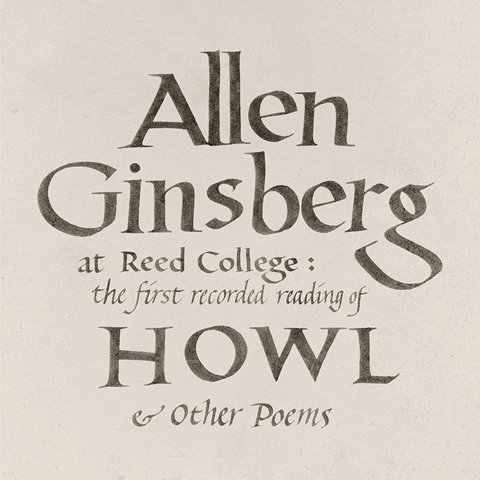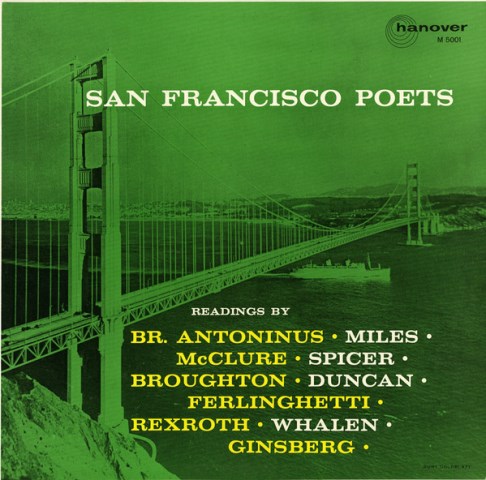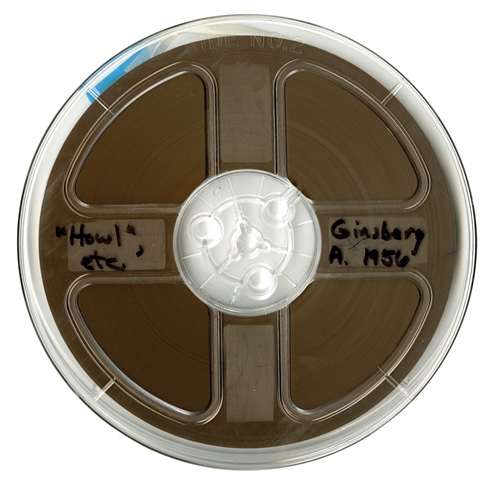Reissue CDs Weekly: Allen Ginsberg - At Reed College: The First Recorded Reading of Howl & Other Poems | reviews, news & interviews
Reissue CDs Weekly: Allen Ginsberg - At Reed College: The First Recorded Reading of Howl & Other Poems
Reissue CDs Weekly: Allen Ginsberg - At Reed College: The First Recorded Reading of Howl & Other Poems
The important, first-ever release of a remarkable personal appearance from February 1956

“I saw the best minds of my generation destroyed by madness, starving hysterical naked, dragging themselves through the negro streets at dawn looking for an angry fix.” The opening words of Allen Ginsberg’s Howl are ingrained.
Lawrence Ferlinghetti’s imprint City Lights Books published the book, after the polymath bookstore owner saw the poet give a reading at the Six Gallery in San Francisco’s later to be hip Fillmore district on 7 October 1955. Until the book came out, Ginsberg’s work was most readily experienced through his personal appearances.
 When the book was published, the pages also included the poems A Supermarket in California, America, In the Baggage Room at Greyhound, Sunflower Sutra and Transcription of Organ Music. But soon after the publication, with the March 1957 police seizure of copies, June's arrest of the City Lights store manager and the declaration that the poem was obscene, Ginsberg was news and Howl in particular became a headline. Following the ensuing August 1957 trial, Judge Clayton W. Horn declared on 4 October that Howl could not be considered obscene. Three weeks later, on 25 October, with the legal wranglings behind him Ginsberg recited Howl on the Berkeley radio station KPFA (A Supermarket in California was also read during this appearance: it’s included on the 1994 Ginsberg box set Holy Soul Jelly Roll: Poems And Songs 1949-1993).
When the book was published, the pages also included the poems A Supermarket in California, America, In the Baggage Room at Greyhound, Sunflower Sutra and Transcription of Organ Music. But soon after the publication, with the March 1957 police seizure of copies, June's arrest of the City Lights store manager and the declaration that the poem was obscene, Ginsberg was news and Howl in particular became a headline. Following the ensuing August 1957 trial, Judge Clayton W. Horn declared on 4 October that Howl could not be considered obscene. Three weeks later, on 25 October, with the legal wranglings behind him Ginsberg recited Howl on the Berkeley radio station KPFA (A Supermarket in California was also read during this appearance: it’s included on the 1994 Ginsberg box set Holy Soul Jelly Roll: Poems And Songs 1949-1993).
Stepping into this chronology is the explicitly titled At Reed College: The First Recorded Reading of Howl & Other Poems, the first-ever release of a live recitation of Howl and, indeed, other poems. The tape was recorded at Portland, Oregon’s Reed College on 14 February 1956, on the second of two days of appearances there by Ginsberg and Gary Snyder. The latter had attended Reed.
Until now, the earliest recording of Howl which could be heard was from 18 March 1956, at Berkeley’s Town Hall Theatre (also on Holy Soul Jelly Roll). After the court case, audiences could first repeatedly hear Ginsberg reading Howl For Carl Solomon (as it was properly credited) in a just-short of 17 minutes recitation on the pivotal 1959 album, San Francisco Poets (pictured below left). That year too, the Fantasy label issued the all-Ginsberg album Howl And Other Poems, which had been recorded in Chicago – Ginsberg wrote a fascinating essay for the back of the sleeve. He became a recording artist in 1959.
 At Reed College is an important release. What’s here is pre-publication, pre-trial and from only four months after the first public reading. Nonetheless, in response to an audience member who says he can’t hear the poet after Over Kansas, Ginsberg responds “I don’t want to corrupt the youth.” It was an academic, safe and tuned-in setting, but Ginsberg already knew the power of his words.
At Reed College is an important release. What’s here is pre-publication, pre-trial and from only four months after the first public reading. Nonetheless, in response to an audience member who says he can’t hear the poet after Over Kansas, Ginsberg responds “I don’t want to corrupt the youth.” It was an academic, safe and tuned-in setting, but Ginsberg already knew the power of his words.
The recording quality is uncannily clear and sharp. There is little audience or background noise. The pages in Ginsberg’s hand can be heard while being rifled. During Over Kansas, a door opens in the distance. Twice, during A Supermarket In America and just before Howl, what sounds likes small plane passes. When the audience is perceptible, it’s mostly when they laugh – during Howl, the word “jism” induces giggles. It’s a fair bet no one there had experienced anything like this before.
Ginsberg himself comes across as genial, personable. There are few introductions to the poems. Usually, the title is enough. He does explain his punctuation. Saying that A Dream Record uses colons prompts laughter. Four poems in, during A Dream Record, his intonation becomes more urgent. Howl is ninth up, and just before reaching it there’s a brief exchange with the (inaudible) audience as he asks the time and whether anyone was there the previous evening. He also explains the nature of the line lengths: like a "bop refrain,” like Lester Young’s music in 1938. After Howl he says “jazz stuff” and begins Howl (Part II), then breaks off saying he doesn’t feel like reading any more: “I haven’t got any kind of steam, so I'd like to cut. Do you mind?” And that’s it.
 The perpetuation of Ginsberg as a recording artist which At Reed College represents comes with a booklet including an essay where the circumstances of the recording are discussed. So is the evolution and structure of Howl. It’s explained that the Howl heard isn’t exactly what was in the City Lights book. Ginsberg was creating and honing as he went along. The use of the words “I don’t want to corrupt the youth” is scrutinised. Beyond noting when they were published and commenting briefly on what is heard on the recordings, the other poems Ginsberg read are not analysed in any depth. There is nothing on why the tape (pictured right, courtesy The Allen Ginsberg Estate) was recorded, or who may have recorded it. A look at this reading in context of Ginsberg’s other activities at this time would have been handy to set the scene, as would how this relates to the other recordings in Allen Ginsberg discography. Perhaps two essays may have helped with getting to grips with this release?
The perpetuation of Ginsberg as a recording artist which At Reed College represents comes with a booklet including an essay where the circumstances of the recording are discussed. So is the evolution and structure of Howl. It’s explained that the Howl heard isn’t exactly what was in the City Lights book. Ginsberg was creating and honing as he went along. The use of the words “I don’t want to corrupt the youth” is scrutinised. Beyond noting when they were published and commenting briefly on what is heard on the recordings, the other poems Ginsberg read are not analysed in any depth. There is nothing on why the tape (pictured right, courtesy The Allen Ginsberg Estate) was recorded, or who may have recorded it. A look at this reading in context of Ginsberg’s other activities at this time would have been handy to set the scene, as would how this relates to the other recordings in Allen Ginsberg discography. Perhaps two essays may have helped with getting to grips with this release?
Before its 2007 discovery, the tape of this remarkable personal appearance sat in a box. Now, it can be heard by anyone. However it’s looked at, the extraordinary At Reed College: The First Recorded Reading of Howl & Other Poems is mind boggling.
- Next week: South London Stinks – post-punk oddballs Disco Zombies get compiled
- More reissue reviews on theartsdesk
- Kieron Tyler’s website
Explore topics
Share this article
The future of Arts Journalism
You can stop theartsdesk.com closing!
We urgently need financing to survive. Our fundraising drive has thus far raised £49,000 but we need to reach £100,000 or we will be forced to close. Please contribute here: https://gofund.me/c3f6033d
And if you can forward this information to anyone who might assist, we’d be grateful.

Subscribe to theartsdesk.com
Thank you for continuing to read our work on theartsdesk.com. For unlimited access to every article in its entirety, including our archive of more than 15,000 pieces, we're asking for £5 per month or £40 per year. We feel it's a very good deal, and hope you do too.
To take a subscription now simply click here.
And if you're looking for that extra gift for a friend or family member, why not treat them to a theartsdesk.com gift subscription?
more New music
 Album: Molly Tuttle - So Long Little Miss Sunshine
The US bluegrass queen makes a sally into Swift-tinted pop-country stylings
Album: Molly Tuttle - So Long Little Miss Sunshine
The US bluegrass queen makes a sally into Swift-tinted pop-country stylings
 Music Reissues Weekly: Chip Shop Pop - The Sound of Denmark Street 1970-1975
Saint Etienne's Bob Stanley digs into British studio pop from the early Seventies
Music Reissues Weekly: Chip Shop Pop - The Sound of Denmark Street 1970-1975
Saint Etienne's Bob Stanley digs into British studio pop from the early Seventies
 Album: Mansur Brown - Rihla
Jazz-prog scifi mind movies and personal discipline provide a... complex experience
Album: Mansur Brown - Rihla
Jazz-prog scifi mind movies and personal discipline provide a... complex experience
 Album: Reneé Rapp - Bite Me
Second album from a rising US star is a feast of varied, fruity, forthright pop
Album: Reneé Rapp - Bite Me
Second album from a rising US star is a feast of varied, fruity, forthright pop
 Album: Cian Ducrot - Little Dreaming
Second album for the Irish singer aims for mega mainstream, ends up confused
Album: Cian Ducrot - Little Dreaming
Second album for the Irish singer aims for mega mainstream, ends up confused
 Album: Bonniesongs - Strangest Feeling
Intriguing blend of the abstract, folkiness, grunge and shoegazing from Sydney
Album: Bonniesongs - Strangest Feeling
Intriguing blend of the abstract, folkiness, grunge and shoegazing from Sydney
 Album: Debby Friday - The Starrr of the Queen of Life
Second from Canadian electronic artist and singer offers likeable, varied EDM
Album: Debby Friday - The Starrr of the Queen of Life
Second from Canadian electronic artist and singer offers likeable, varied EDM
 Music Reissues Weekly: The Pale Fountains - The Complete Virgin Years
Liverpool-born, auteur-driven Eighties pop which still sounds fresh
Music Reissues Weekly: The Pale Fountains - The Complete Virgin Years
Liverpool-born, auteur-driven Eighties pop which still sounds fresh
 Album: Indigo de Souza - Precipice
US singer's fourth ups the pop ante but doesn't sacrifice lyrical substance
Album: Indigo de Souza - Precipice
US singer's fourth ups the pop ante but doesn't sacrifice lyrical substance
 Album: Mádé Kuti - Chapter 1: Where Does Happiness Come From?
Lively new album from the third generation of Nigeria's first musical family
Album: Mádé Kuti - Chapter 1: Where Does Happiness Come From?
Lively new album from the third generation of Nigeria's first musical family
 The Human League/Marc Almond/Toyah, Brighton Beach review - affable 1980s-themed seaside package
Retro pop extravaganza bolstered by a (mostly) balmy evening
The Human League/Marc Almond/Toyah, Brighton Beach review - affable 1980s-themed seaside package
Retro pop extravaganza bolstered by a (mostly) balmy evening
 Album: Alice Cooper - The Revenge of Alice Cooper
The original Alice Cooper band are back to fly the flag for all the weirdos
Album: Alice Cooper - The Revenge of Alice Cooper
The original Alice Cooper band are back to fly the flag for all the weirdos

Add comment